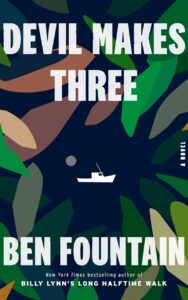BOOK SHORT
‘Devil Makes Three‘
by Ben Fountain
By Stephanie Miller

Enter the lawlessness of Haiti, 1991, when a violent coup d’etat results in the fall of President Jean-Bertrand Aristide, who escapes to Washington, DC. We meet American expat Matt Amaker, who is forced to abandon his beautiful and nearly profitable scuba diving business to the brutal military dictatorship now taking over the country. As far as Matt knows, they took it for the beach access, perfect for running illegal imports. An international embargo adds to the chaos and violence as factions of powerful players vie for control.
Matt turns to his business partner and friend Alix Variel, the entrepreneurial son of a socially prominent Haitian family. Their business destroyed, they devise a scheme to raise 18th century shipwrecks for the priceless treasure rumored to lie along the Haitian coast. Their attempts to fund the dive through a wealthy, eccentric businessman trigger a flood of disastrous events – including one where Alix’s sister Misha uncovers an arms-trafficking ring disguised as a US government humanitarian aid office.
There, rookie CIA agent Audrey O’Donnell finds herself doing clandestine work for a ”sponsored transnational lynch mob,” that leads many of her key sources – including Misha, Matt, and Alix – dead, imprisoned, or exiled. I found it hard to empathize with Audrey’s choices, although Fountain does try to humanize her.
Audrey is both ruthless and naive, blithely exploring voodoo practices while building her source network. Misha dislikes her, and at one point, “smiled at (Audrey) and thought about the infinity of things Haitians couldn’t afford, sentimentality being one of them.”
‘Watching your country die.’
It is impossible for ordinary Haitians to make sense of or maneuver through the quagmire of dueling political factions. A local explains to Matt at a party, “Angry and bitter, that’s a terrible way for a person to be. But it’s awful, watching your country die. I cannot recommend the experience.”
Told in three voices, Matt, Misha and Audrey, the award-winning author of “Billy Lynn’s Long Halftime Walk” takes on a little known, but highly significant slice of American history, exposing cracks in our culture and global leadership. It highlights the blood politics and power struggles of one of America’s island allies, and questions the American aims and policies which surely contributed to the upheaval and daily struggles for dignity, fair work, food, and safety faced by the Haitian people. It gives us a glimpse into the long historical battle for control in the country and turns out to be a rather psychological study of power, domination, self-preservation, and ego.
Micro Shorts
‘Terrace Story,’ by Hilary Leichter
A beautiful terrace suddenly appears in the closet of a cramped city apartment owned by a young family. Soon, it is clear that the entrance only opens when their friend Stephanie visits. Stephanie gets invited over a lot. This short novel traces how the astonishing expansion of space affects everyone who comes into contact with Stephanie’s secret superpower, including Stephanie herself. The story is dark but compelling. Leichter keeps it brief and focused.
‘Mercy,’ by Lara Santoro — Maine author
Anna, an Italian journalist stationed in Nairobi, is maneuvered by flamboyant and charismatic Mercy into hiring her as a house girl. While the insight into the lifestyle of international journalists is fascinating, it is Mercy who is the heart and soul of Santoro’s first novel. With the pace of a fast-moving news story, we follow Mercy in her quest for money, stature, and possibly happiness, although it is hard to know what really makes Mercy content. Wrapped up in a sobering view of the slums, political unrest, and the burgeoning AIDS pandemic, we fall in love with Mercy’s tenacity and wisdom, as Anna herself grows to depend on and admire her.
‘The Veins of the Ocean,’ by Patricia Engel
Several in book club didn’t like this novel’s rather fantastic immigrant story of loss and faith, but I mostly found it heartbreakingly sad, despite the hopeful, happy ending. Woven through the story is a sister’s dedication to her imprisoned brother. Cast adrift after his unexpected death, she moves to a remote corner of Florida, connecting with another drifting immigrant, and together they slowly learn to trust. Dealing with grief, anger, and guilt, she comes to terms with the right to live her own life. Along the way are interesting insights into the cultures of Columbia and Cuba.





